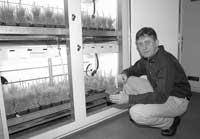Plants: the plastic factories of the future
2001/04/01 Elhuyar Zientzia Iturria: Elhuyar aldizkaria

Clint Chapple, of the Purdue University of the United States, and Knut Meyer, of DuPont and Co., have discovered a gene that allows to pack and accumulate material in plant cells and that can be used to make new types of plastics. Currently, plastic is generated by the construction of chains with compounds derived from oil.
These chains are called polymers and the molecules that form polymers are monomers. Plants also produce substances that can be used as monomers. To protect these substances from external attacks, the molecules of the plant combine to form stable and soluble forms of the compound, and subsequently, the monomers generated in small internal structures of the cell are stored.
In this way, the monomers are protected from the biochemical reactions that occur in other parts of the plant. In view of this mechanism, scientists have used the Arabadopsi Thaliana plant to clone the gene that produces the enzyme related to the combination of molecules. The objective is to obtain the maximum number of monomers necessary for the manufacture of plastic.

Gai honi buruzko eduki gehiago
Elhuyarrek garatutako teknologia






